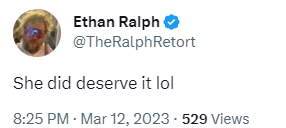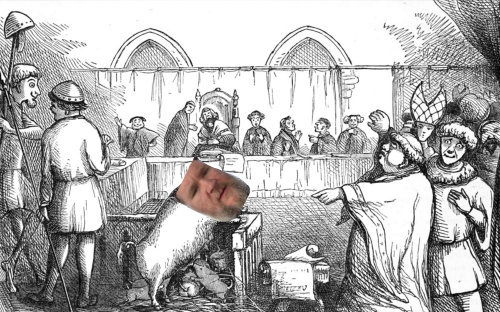Recently, after literally over a year of claiming he was not a convicted sex offender, and that 'revenge porn' was "not a crime", convicted felon Ethan Ralph decided to change legal strategy on the whole matter. Now he is making the claim that it was not a revenge porn issue, it was a copyright issue. And because he believes he owns the copyright to the revenge porn he shared, ergo he is innocent. Neither the court nor the law agreed with him in this.
Virginia is one of the many states in the United States that has enacted a law specifically addressing revenge porn. Virginia’s law, which was signed into law in 2014, makes it illegal to knowingly and intentionally distribute sexually explicit images of another person without their consent, with the intent to coerce, harass, or intimidate that person. The law defines sexually explicit content as any image, photograph, film, or video that depicts a person who is nude or engaged in sexual activity, and where the person depicted had a reasonable expectation of privacy.
Under Virginia’s law, the distribution of revenge porn is considered a Class 1 misdemeanor, punishable by up to 12 months in jail and a $2,500 fine. If the offender disseminates the images with the intent to extort or obtain something of value, or if the victim is a minor, the offense is elevated to a Class 6 felony, which carries a potential prison sentence of up to five years.
It's important to note that revenge porn is a violation of a person's privacy rights, rather than a copyright issue. Copyright law protects the rights of creators of original works, such as music, movies, books, and photographs. Revenge porn, on the other hand, involves the unauthorized distribution of images that depict an individual in a sexual manner without their consent. The distribution of these images without permission violates the individual's right to privacy and can have severe and lasting consequences for the victim, including emotional distress, loss of reputation, and even loss of employment opportunities.
Revenge porn is also often used as a tool for harassment and blackmail, as the distribution of these images can be used to exert power and control over the victim. This is why many states, including Virginia, have enacted laws specifically criminalizing the distribution of revenge porn. These laws recognize that this behavior is not only morally reprehensible but also has serious legal consequences.
In addition to criminal penalties, victims of revenge porn in Virginia may also pursue civil remedies, such as seeking a restraining order or filing a lawsuit against the person who distributed the images. They may also be able to recover damages for any harm suffered as a result of the distribution of the images.
And even if it were a copyright issue, Ethan Ralph is the last person in the world who a rational person would listen to about issues of copyright since he frequently abuses the DMCA system to flag down people he does not like. On top of that he also frequently plays copyrighted materials on his shows without permission or authorization from the actual copyright holders, be it Tucker Carlson clips, bad rap music, or other content creators, some of which he has falsely flagged despite them falling within the 'Fair Use' exception. And his lack of creativity does not just show in his blatant abuse and use of copyrighted materials on his show, but even the idea of revenge porn being a copyright issue is someone else's idea, albeit someone who might be equally as smart as Ralph, but neither are scoring over room temp on the IQ scale. Meet proto-Ralph, Benjamin Jay Barber.

In December 2016, the first conviction for revenge porn in the state of Oregon was handed down. It involved a 31-year-old man, Benjamin Barber, who was sentenced to 6 months in jail and five years of probation for sharing intimate photos and videos of his ex-girlfriend without her consent.
The case began in June, when the victim contacted police after discovering that Barber had shared explicit images and videos of her with others. She told investigators that she had dated Barber for about a year, during which time they had taken intimate photos and videos together. After the relationship ended, she found out that Barber had shared the images with at least one other person, and possibly more.
Oregon's revenge porn law, which was enacted in 2015, makes it a crime to share intimate images of another person without their consent, with the intent to cause them harm or embarrassment. The law applies to images that were taken with the person's consent, as well as those taken without their knowledge or consent. In Barber's case, the prosecution argued that he had shared the images with the intent to harm his ex-girlfriend, and that he had done so despite knowing that she did not consent to the sharing.
At trial, the victim testified about the emotional toll that the sharing of the images had taken on her. She told the court that she felt violated and embarrassed and that she had suffered from anxiety and depression as a result of the incident. She also said that she had lost job opportunities and had been forced to move to a new city to escape the harassment and humiliation she experienced after the images were shared.
The defense argued that Barber had not intended to harm his ex-girlfriend, and that he had only shared the images because he was feeling lonely and wanted to reconnect with her. However, the jury ultimately found him guilty on all counts.
Barber's case is significant because it is the first revenge porn conviction in Oregon since the law was enacted. The case is also noteworthy because it reflects a growing trend across the country of lawmakers taking action to address the issue of revenge porn. As more and more states pass laws criminalizing the sharing of intimate images without consent, prosecutors are increasingly seeking to hold offenders accountable for their actions.
According to a report by the Cyber Civil Rights Initiative, as of 2021, 46 states and the District of Columbia have criminalized revenge porn in some form. In addition, several states have enacted laws that allow victims to sue their perpetrators for damages. These laws represent a significant step forward in the fight against revenge porn, which has become an increasingly common form of online harassment and abuse.
However, despite the progress that has been made, revenge porn remains a difficult crime to prosecute. In many cases, victims are reluctant to come forward out of fear of retaliation or further embarrassment. Even when cases do make it to court, it can be challenging to prove that the sharing of the images was done with malicious intent.
As the case of Benjamin Barber demonstrates, however, revenge porn can have serious consequences for both the victim and the perpetrator. For victims, the sharing of intimate images can cause lasting emotional and psychological damage, as well as financial and professional harm. For perpetrators, the act of sharing the images can result in criminal charges, jail time, and significant legal and financial penalties.
In conclusion, revenge porn is a serious violation of an individual's privacy rights and can have lasting consequences on the victim's emotional and professional well-being. Many states have enacted laws specifically addressing revenge porn, including Virginia and Oregon, which make it illegal to distribute sexually explicit images of another person without their consent. In Virginia, revenge porn is considered a Class 1 misdemeanor punishable by up to 12 months in jail and a $2,500 fine, while in Oregon, the penalty can include a prison sentence of up to 13 months and five years of probation. It's important to note that revenge porn is not a copyright issue and that laws are recognizing this behavior's serious legal and moral implications. Further still, Ralph has already been convicted of Revenge Porn, and he is already a convicted sex offender from it, so not only is this legal strategy bogus, but also like Amanda Ralphs's fictitious declarations in recent court filings, it's also irrelevant.















